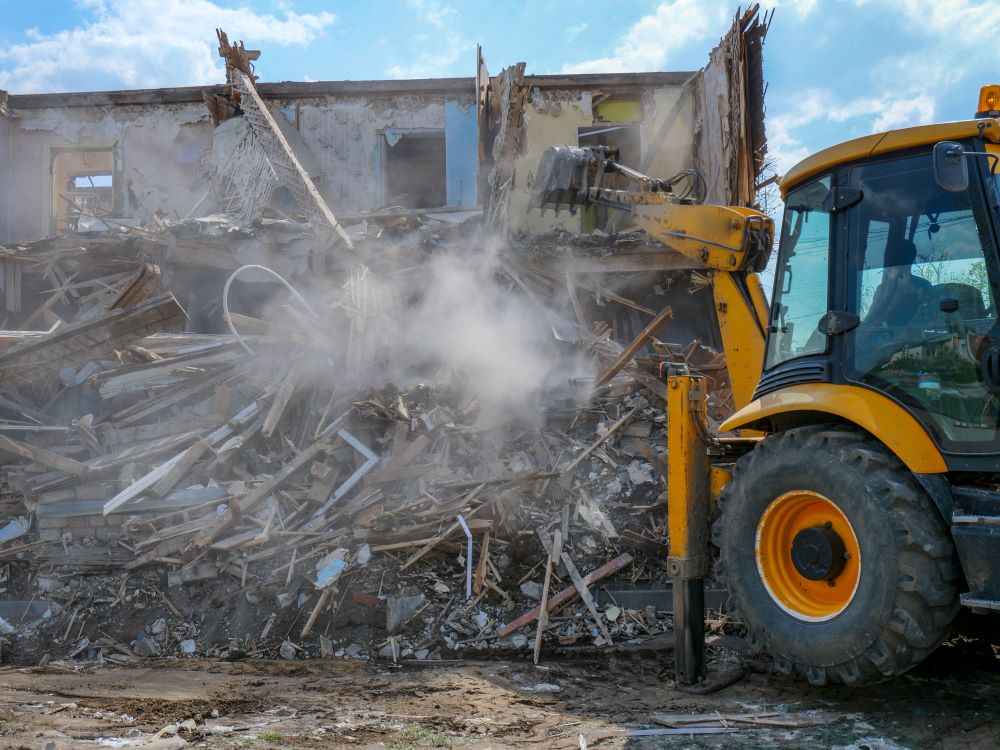
Demolition Services in Maximizing Commercial Project’s Budget
Want to get the most out of the money for your business project? Using commercial demolition services is one successful tactic. Demolition services are essential to the development process because they provide an economical and effective approach to removing old buildings and creating space for new ones.
You may make the most use of the existing space and steer clear of expensive repairs or renovations by getting rid of unnecessary constructions or parts of a property. Remember to take into account a commercial demolition service’s track record, credentials, and expertise when choosing one. Choose a business that shares the objectives and ideals of your project and offers high-quality work that is completed on schedule and using eco-friendly methods. Incorporating demolition services into the design of your business project can help you save costs and expedite the building process, which will eventually result in a successful project.
OUR SERVICES
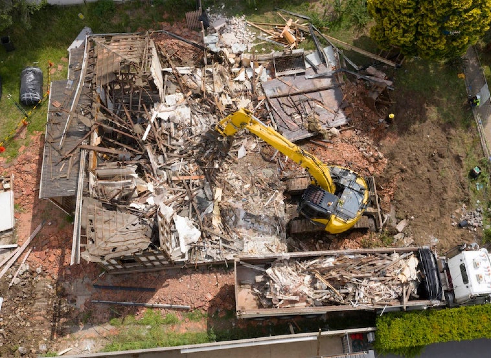
Structure Demolition. Residential, Commercial & Industrial
If your structure poses a health, safety, or environmental risk, demolition can prevent costly citations or fatal accidents. While this may seem daunting, you are just a phone call away from having your residential demolition done professionally, responsibly, and at a great price.
Talk to a Demolition Specialist Now! 916.249.5001
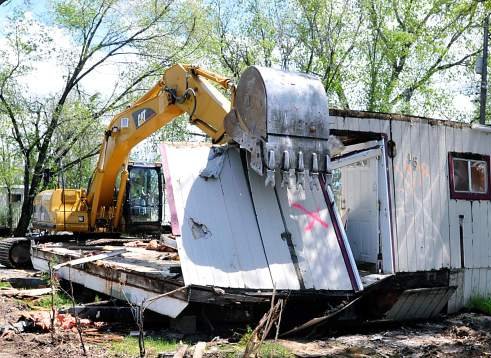
Mobile Home Demolition
We demolish and haul away mobile homes. Any size, anywhere, anyhow. We are fast, clean and competitive. We serve most of Northern California. There are many factors to consider when removing or demolishing your old trailer, mobile home, or manufactured home like: the processes involved, costs, time, contractors, debris, and permits.
Talk to a Demolition Specialist Now! 916.249.5001
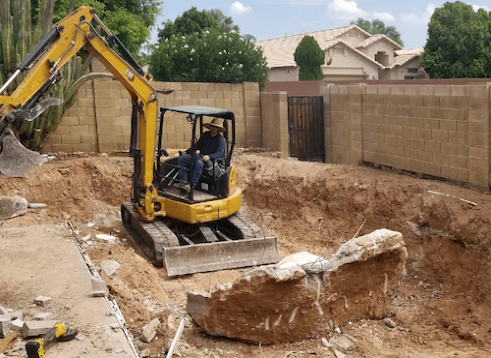
Pool Demolition
When removing a pool in Sacramento, California with the professional demolition team of Maxton Demo, you’re guaranteed peace of mind from beginning to end. From your initial request for an estimate to clean-up, you can expect our pool demolition process that’s completely professional and safe.
Talk to a Demolition Specialist Now! 916.249.5001
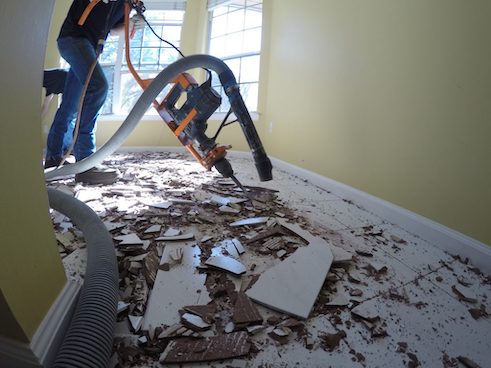
Floor Demolition
Flooring demolition, like any other major home renovation work, requires a specific set of skills and tools to be performed properly. You need experts in flooring demolition to get you the best floors possible. Contact us to find out more about how we can help you today.
Talk to a Demolition Specialist Now! 916.249.5001
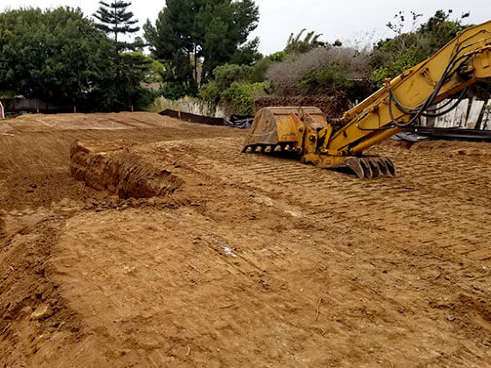
Grading & Excavating
If you need an experienced excavator and grader in Sacramento, call us today. One of the many reasons that residential, commercial, and industrial customers choose to work with us is because we’re able to provide a broad range of services to help construction-related projects get done in less time and at a reduced cost.
Talk to a Demolition Specialist Now! 916.249.5001

Roof Snow Removal
Heavy snow & ice dams can cause significant roof and home damage. Roof Snow removal is our specialty during the winter months. Serving the Sacramento, California area for 10 years, we can get your roof snow removed and promise a quick response and reasonable rates.
Talk to a Demolition Specialist Now! 916.249.5001
Budget Optimization’s Significance in Commercial Projects
Budget optimization is not only an objective in the field of commercial development; it is a need. Effective resource allocation impacts all aspects of a project, from the timeframe to the end result, and defines its success. Effective budget management guarantees that each dollar adds to the finished project’s worth and usefulness.
Even the most well-planned projects may be derailed by budget overruns, which result in delays, lowered quality, and reduced returns. As a result, developers and project managers are always looking for new and creative methods to increase their budgets without compromising on scope or quality.
Including demolition services at the beginning of the project is an often disregarded method for budget minimization. Developers may more effectively decrease waste, reuse resources, and make room for new development by strategically demolishing existing buildings.
How to Make the Most of Your Budget with Demolition Services
There is more to commercial demolition services than just demolishing buildings. With appropriate preparation and implementation, they provide a route to considerable cost reductions and budget optimization.
First of all, skilled demolition firms are skilled at determining which components of a building can be safely and effectively removed and which may be salvaged or reused, thereby saving money on materials for future construction. This helps a project achieve its sustainability objectives while also lowering the cost of new materials.
Additionally, demolition professionals use cutting-edge tools and methods to shorten the time required to clear a site, which lowers labor costs and guarantees that the next stages of construction can start on schedule.
Things to Take Into Account When Selecting a Demolition Service Supplier
Selecting the best commercial demolition service provider is essential to making the most of your project’s budget and guaranteeing a seamless demolition phase. When assessing possible businesses, take into account their background and performance history on projects comparable to yours.
Since certifications and licenses demonstrate a provider’s dedication to safety and legal compliance, they cannot be negotiated.
Additionally, evaluate their attitude toward environmental sustainability, taking into account recycling and waste management procedures, since they might affect project costs and the environmental effect of your business.
To make sure they meet the requirements of your project, talk about schedules, price quotes, and the scope of their services. To assist you in making an educated choice, a trustworthy commercial demolition service provider should be open and honest about their strengths and weaknesses.
Employing a Skilled Commercial Demolition Service Provider
Choosing the best demolition service provider is a crucial choice that may have a big impact on the project’s price and success. A trustworthy contractor ensures that the demolition is done safely, effectively, and in accordance with all requirements by contributing a multitude of experience, knowledge, and resources.
A prospective contractor’s track record, including prior commercial demolition projects, safety records, and customer testimonials, should be taken into account while assessing them. To verify their qualifications and compliance with industry norms, certifications and licenses should also be checked.
Furthermore, while selecting a contractor, openness and communication are crucial. A competent demolition business should provide a thorough project plan that includes budget estimates, schedules, and trash management techniques. This degree of transparency and clarity encourages teamwork, which is crucial for handling obstacles and modifications that may come up during the project.
Factors Influencing Commercial Demolition Project Budgets
The cost of a commercial demolition project may be greatly impacted by a number of variables. First and foremost, the building’s size and complexity are important considerations. Larger constructions cost more because they need more work, materials, and time. Furthermore, the existence of dangerous substances like lead or asbestos may call for specific removal procedures, which would raise costs even further.
The budget is also affected by location. Due to logistical difficulties, noise regulations, and possible disturbances to surrounding companies and homes, projects in highly populated metropolitan areas may be more expensive. The kind and amount of equipment that may be utilized might also be impacted by accessibility concerns, which could lengthen the project’s duration and increase its cost.
Finally, permits and regulatory procedures are a major financial factor. The cost of obtaining the required permissions may vary significantly based on the project’s location and complexity, and compliance with local, state, and federal rules is a must. These and other considerations highlight how crucial careful budget preparation is for commercial demolition projects.
Budget Planning Is Essential for Commercial Demolition
For a commercial demolition project to be financially viable, careful budget preparation is essential. It facilitates the early detection of any cost overruns, enabling corrections before they worsen. A well-organized budget also guarantees that every facet of the demolition process—from personnel and supplies to permits and trash management—is tracked down and effectively controlled.
Additionally, budget planning makes it easier for customers, contractors, and government agencies to communicate clearly with one another. Throughout the course of the project, accountability is maintained and expectations are defined by creating a clear financial structure. In addition to reducing financial shocks, this cooperative strategy increases confidence and trust amongst all stakeholders.
Additionally, strategic budgeting offers a chance to investigate cost-cutting strategies without sacrificing quality or safety. Through the evaluation of various demolition techniques, choices for recycling materials, and contractor bids, project managers may make well-informed decisions that maximize the project’s total value and minimize costs.
Cost-Reduction Strategies for Commercial Demolition Projects
Carefully assessing the project’s scope and looking for chances to recycle and salvage materials are two efficient ways to save expenses. Some of the expenses associated with demolition may be mitigated by the sale or reuse of materials like steel, concrete, and wood. To further increase savings, selected demolition procedures might save important structural components for future use.
Competitive bidding is another way to save costs. It is possible to compare services and costs in depth by obtaining quotations from many trustworthy demolition firms. In addition to guaranteeing fair market pricing, this also makes it possible to negotiate parameters that might result in large budget cuts.
Finally, there may be financial advantages to streamlining the demolition timeline. Project costs may be successfully decreased by arranging the demolition at off-peak times when contractors could offer cheaper prices or by planning the work to take place during hours that limit overtime and interruptions. These elements of strategic planning are essential for controlling and maybe reducing the project’s total budget.
Assessing the Project’s Scope
For precise budgeting and efficient administration, a comprehensive assessment of the project scope is essential. This entails thorough site inspections to ascertain the building’s condition, the existence of hazardous materials, and the amount of the necessary destruction. Comprehending these components is essential to creating a strategic demolition strategy that fits project objectives and financial limitations.
The demolition strategy may also be impacted by prospective redevelopment plans and future land usage. For example, certain foundations or buildings could be kept if the location is intended for comparable commercial usage. Long-term cost and time savings are possible with this foresight, underscoring the need for thorough scope appraisal.
Managing Waste Effectively in Commercial Demolition
Commercial demolition involves waste handling, which has financial and environmental ramifications. In addition to supporting environmental initiatives, properly sorting, recycling, and disposing of demolition trash may save money. Metals, concrete, and bricks are just a few of the resources that may be recycled or sold for use in other building projects after being salvaged from demolition sites.
Furthermore, in order to prevent fines and legal problems, it is essential to follow environmental legislation and garbage disposal recommendations. Investing in effective waste management techniques may improve the project’s public image and show a dedication to environmental responsibility, which may draw in additional business down the road.
Possible Difficulties in Commercial Demolition Initiatives
Unexpected structural issues and permit clearance delays are only two of the difficulties that commercial demolition projects may face. Asbestos and other hazardous materials need to be handled and disposed of carefully, which increases their complexity and expense. Concerns about preserving safety in crowded regions and causing the least amount of disturbance to nearby companies and citizens are also ongoing issues.
To overcome these obstacles, proactive preparation, clear communication, and adaptability are essential. Project managers may reduce risks and guarantee the project remains on schedule by foreseeing any problems and including backup plans in the budget.
Getting Commercial Demolition Services at a Low Cost
The process of commercial demolition is difficult and complicated, requiring careful preparation, specialized expertise, and smart budget management. Project managers may overcome the obstacles and provide cost-effective demolition services by choosing the best demolition contractor, emphasizing efficient waste management, and comprehending the elements that affect prices.
A successful demolition operation and considerable cost savings may result from incorporating the advice and insights presented in this article into your project planning. Recall that careful planning, wise choices, and a dedication to safety and environmental regulations are the keys to economical commercial demolition.
Effective Demolition Techniques to Reduce the Cost of Commercial Projects
When it comes to commercial building projects, demolition is essential to clearing the way for new construction. Nevertheless, a lot of companies fail to consider the potential financial savings that effective demolition techniques might provide. Businesses may reduce wasteful spending and maximize project costs by using well-thought-out and performed demolition techniques.
We explore effective demolition techniques for commercial projects in this post. We examine the several methods that may be used to expedite the demolition process, shorten project schedules, and ultimately save costs. We find the best methods to save expenses without sacrificing quality or safety, from selective demolition to recycling and material salvage.
Whether you’re starting a big commercial construction project or a small-scale remodel, knowing how to improve demolition efficiency may save a lot of money. Come along as we explore effective demolition techniques and find useful advice and solutions that will help your company remain under budget and complete projects on time.
The Value of Effective Demolition Techniques in Business Projects
Although demolition is sometimes thought of as only the act of pulling down buildings, it really plays a much more important part in the commercial project lifecycle. Beyond only removing old buildings, effective demolition techniques provide the basis of project planning and cost control. Businesses may find ways to save costs while guaranteeing a seamless transition to the construction phase by focusing on efficiency.
Effective demolition has several advantages. First of all, by reducing unanticipated expenses linked to careless demolition methods, they help project managers to precisely predict and manage budgets. Second, demolition efficiency affects the project’s total schedule. Simplifying this first stage will allow other stages to start earlier, cutting down on the overall project time and related expenses.
Furthermore, sustainable building concepts are naturally compatible with effective demolition techniques. They promote material salvage and recycling, which not only promotes environmental care but also has financial advantages. Projects may further optimize total project expenditure by recovering a portion of the original demolition expenditures via the sale or reuse of salvaged materials.
Typical Obstacles in Commercial Demolition
Projects involving commercial demolition can provide a special set of difficulties. Managing the unforeseen is one of the main problems. Unexpected risks like asbestos or lead may be concealed by structures, necessitating expert removal that might raise expenses and cause delays in schedules.
Ensuring safety is another major problem. Due to the inherent dangers of commercial demolition projects, worker and public safety must always come first. This calls for careful preparation, observance of safety procedures, and sometimes creative risk-reduction techniques.
Commercial demolition is also heavily influenced by environmental considerations. Regulations pertaining to dust control, noise, and waste disposal must be followed by project managers. In addition to penalties and delays, noncompliance may harm the project’s image.
Evaluating the Project’s Needs and Goals
Any demolition project must begin with a comprehensive evaluation of its goals and needs. This entails a thorough examination of the building that will be destroyed, taking into account its components, construction techniques, and any possible risks. Planning an efficient approach is aided by having a thorough understanding of the demolition’s scale and complexity.
The project’s ultimate objectives should be taken into account in this evaluation. For instance, demolition may be easier if the purpose is to make way for new development rather than to conserve certain pieces for historical importance. The tools and demolition techniques used will also be influenced if reusing or reselling materials is a top concern.
During this stage, consulting specialists might provide insightful information. The finest methods for the job might be advised by structural engineers, environmental consultants, and demolition experts. This teamwork guarantees that the demolition plan complies with all requirements and is in line with the project’s goals.
Recognizing the Different Demolition Technique Types
Demolition methods come in a broad range and are chosen according to the particular requirements and limitations of a project. Deconstruction, selective demolition, implosion, and mechanical demolition are the primary techniques. Every approach offers a unique set of benefits and may be used for various business tasks.
The most popular technique, mechanical demolition, involves demolishing buildings with the use of large equipment like bulldozers and excavators. This approach is quick and economical, which makes it perfect for tasks where price and timeliness are crucial considerations. Another method is implosion, which employs explosives to destroy big buildings. Despite being magnificent, it is best suited for tasks where mechanical destruction is not practical and requires careful preparation.
The more careful methods of selective demolition and deconstruction concentrate on keeping important components of a building intact for recycling or reuse. In the context of green building certifications and sustainable construction, these techniques are very pertinent. The long-term advantages in terms of material cost reductions and environmental effect are substantial, even if they could involve more time and work.
Considerations for Selecting a Demolition Strategy
There are a number of important factors to take into account when choosing the best demolition plan for a commercial project. The structure’s size and complexity, the project schedule, financial limitations, and environmental requirements must all be evaluated by project managers. This decision-making process also heavily weighs the possibility of material recycling and salvage.
The viability of certain demolition techniques depends on the structure’s size and kind. For example, whereas smaller structures may be appropriate for selective demolition or deconstruction, larger commercial buildings may need the use of mechanical destruction or implosion. Another crucial consideration is the project timetable; projects with constrained timeframes may put speed ahead of material recovery.
The choice of demolition approach is also influenced by financial limitations. Selective demolition and deconstruction may provide financial benefits via the sale or reuse of recovered components, but mechanical demolition and implosion often have lower upfront expenses. The choices may be further limited by environmental laws and the project’s sustainability objectives, which may favor approaches that cut down on waste and carbon emissions.
Do you have a Question?
Talk to a Demolition Specialist Now! 916.249.5001
Request Formal Quote